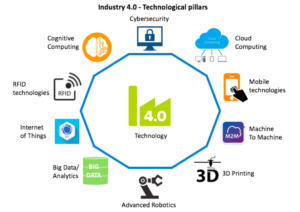There are four design principles in Industry 4.0. These principles support companies in identifying and implementing Industry 4.0 scenarios.
- Interconnection: The ability of machines, devices, sensors, and people to connect and communicate with each other via the Internet of Things (IoT) or the Internet of People (IoP)
- Information transparency: The transparency afforded by Industry 4.0 technology provides operators with vast amounts of useful information needed to make appropriate decisions. Inter-connectivity allows operators to collect immense amounts of data and information from all points in the manufacturing process, thus aiding functionality and identifying key areas that can benefit from innovation and improvement.
- Technical assistance: First, the ability of assistance systems to support humans by aggregating and visualizing information comprehensively for making informed decisions and solving urgent problems on short notice. Second, the ability of cyber physical systems to physically support humans by conducting a range of tasks that are unpleasant, too exhausting, or unsafe for their human co-workers.
- Decentralized decisions: The ability of cyber physical systems to make decisions on their own and to perform their tasks as autonomously as possible. Only in the case of exceptions, interference, or conflicting goals, are tasks delegated to a higher level.


